Trump Covid: How his experience compares with Boris Johnson's
- Published
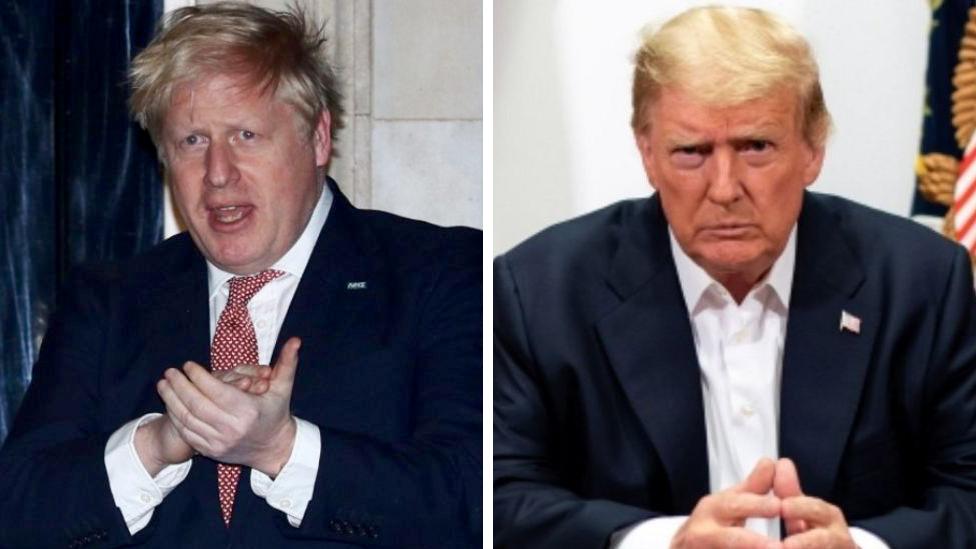
Boris Johnson (L) and Donald Trump
Donald Trump and Boris Johnson have a lot in common - distinctive hairstyles, larger-than-life personalities and a habit of creating controversy.
And now they share the unwanted experience of being leaders taken to hospital with coronavirus.
The US president is currently being treated for the disease, six months after UK Prime Minister Mr Johnson fell victim to the same virus.
But how do their experiences compare - and what, if anything, can the US learn from the UK's experience?
On 27 March, the UK Prime Minister announced he had tested positive for Covid. It was not hugely unexpected given the virus had ripped its way through the top levels of UK government - infecting ministers and senior advisers.
In a Twitter video Mr Johnson said he had experienced "mild symptoms" but insisted he was - "thanks to the wizardry of modern technology" - still leading the government's response despite self-isolating.
One week later he announced that a persistent temperature meant he would have to continue self-isolating.
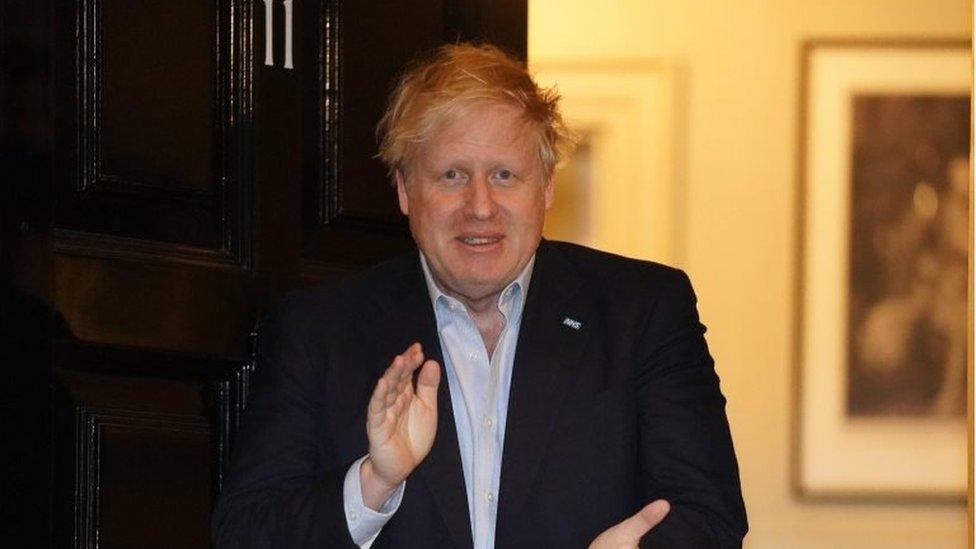
Boris Johnson looked noticeably unwell when he appeared outside Downing Street a few days before going into hospital
Two days later, Health Secretary Matt Hancock said his boss had "very much got his hand on the tiller". But that evening Mr Johnson was admitted to hospital - although Downing Street stressed this was "a precautionary step".
Twenty-four hours later the shocking news came that his condition had "worsened" and the prime minister had been moved to the intensive care unit.
Parallels
There are parallels between Mr Johnson's experience and Mr Trump's. Like the prime minister, Mr Trump has been keen to emphasise that he is still at work, posting pictures of himself at a desk with documents.
Both their visits to hospital were described as precautionary - Mr Trump's team said it had been motivated by an "abundance of caution".
And both leaders - being male, over 50 and overweight - are in an at-risk category.
However, there are also differences. Updates on Mr Johnson's condition came solely from the Downing Street spokesperson, rather than the hospital or his doctor, whereas in the US, the president's doctors have held press conferences.
In some ways this caused confusion - particularly when Dr Sean Conley's account conflicted with briefings from White House staff.
Dr Sean Conley said he was trying to "reflect the upbeat attitude" of his team by not revealing the president received oxygen
But unlike in the UK, US journalists were able to question the medical team - and perhaps as a result Americans got a broader picture of their leader's health.
It speaks to a wider difference between the two countries. In America, a whole medical unit based in the White House is devoted to the care of the president and candidates to the presidency are now expected to release medical records
No such set-up exists in Downing Street and if you Google medical records plus Jeremy Corbyn (the former leader of the opposition) you are more likely to get hits for stories about the National Health Service, than any personal information.


Two blonde leaders get Covid and end up in hospital.
But that's where the similarities end.
There are vast constitutional and cultural differences between British and American politics.
The cultural first: men in white coats in front of a microphone. We've seen that in Washington.
Updates from the doctors, in front of the cameras. Updates with detail too: the drugs the president's on, the days he's getting them.
There is no way medics at St Thomas's Hospital in London were ever going to offer a running, public commentary on the prime minister's health, let alone the content of their syringes.
Oh, and an American president has a medical team and facilities on hand at the White House.
In contrast, Boris Johnson was holed up on his own, upstairs in Downing Street, his tea left at the door of his flat.
And now the constitutional: in short, America has one, the UK doesn't.
So while the question of who takes over isn't easily answered in the UK, there's a long established plan in the US.

Left in limbo
Once the prime minister was admitted into intensive care, his Foreign Secretary, Dominic Raab, was asked to deputise "where necessary".
In the US, the 25th Amendment sets out the conditions for a vice-president assuming power from his boss, but in the UK, with its unwritten constitution and enthusiasm for precedents over codified rules, there is no formal power that allows for such a transfer of responsibility.
We knew very little about the exact extent of Mr Raab's authority - and opposition leader Sir Keir Starmer suggested Mr Raab, was "reluctant" to take decisions, leaving the government in a kind of limbo while the Prime Minister recuperated.
Constitutional expert Dr Catherine Haddon of the Institute for Government said at the time: "The lack of a plan for who can take over when the prime minister is incapacitated looks extraordinary to many in the country and abroad."
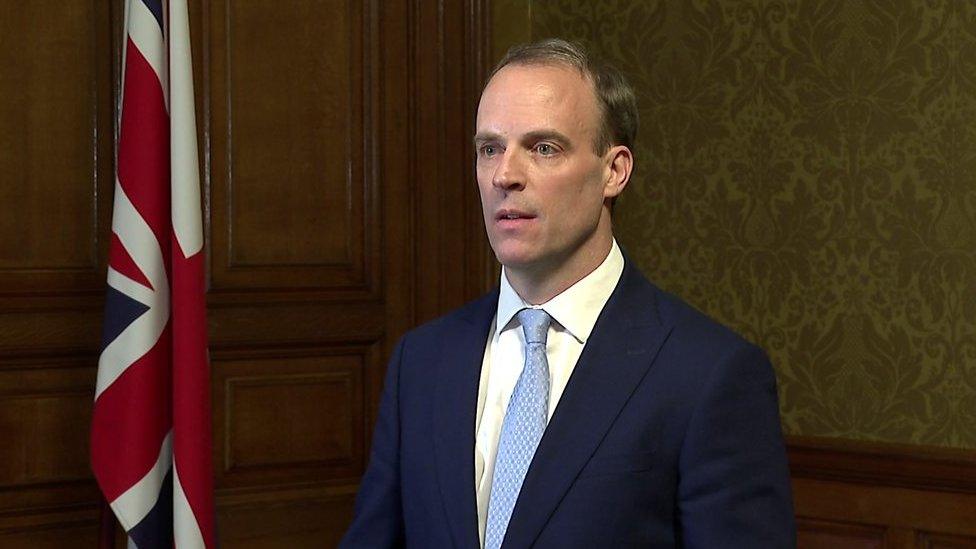
Dominic Raab deputised for the prime minister as he was moved to intensive care.
Since his admission to hospital, there has been speculation about how Mr Trump's poll ratings will be affected - particularly with the presidential election one month away.
Looking at the UK example - not much is the answer.
BBC political analyst Peter Barnes says Boris Johnson's personal approval ratings went up - hitting 50% and above - when government introduced measures to tackle coronavirus.
The high ratings continued throughout the period that the prime minister was ill, and into May, before starting to fall back.
'Several butchers' dogs'
Mr Johnson came out of hospital on 12 April and returned to work after a two-week break.
Yet six months on, there has been some speculation over whether the Prime Minister is fully recovered. However, when asked if he was suffering from long Covid, Mr Johnson insisted he was "as fit as several butchers' dogs".
His spell in hospital has prompted at least one change in his behaviour. The prime minister has acknowledged he was "too fat" when he caught the virus and has hired a personal trainer to get him fit.
So in a few months' time, Americans may get used to seeing pictures of Mr Trump running laps round the Rose Garden.
- Published6 October 2020
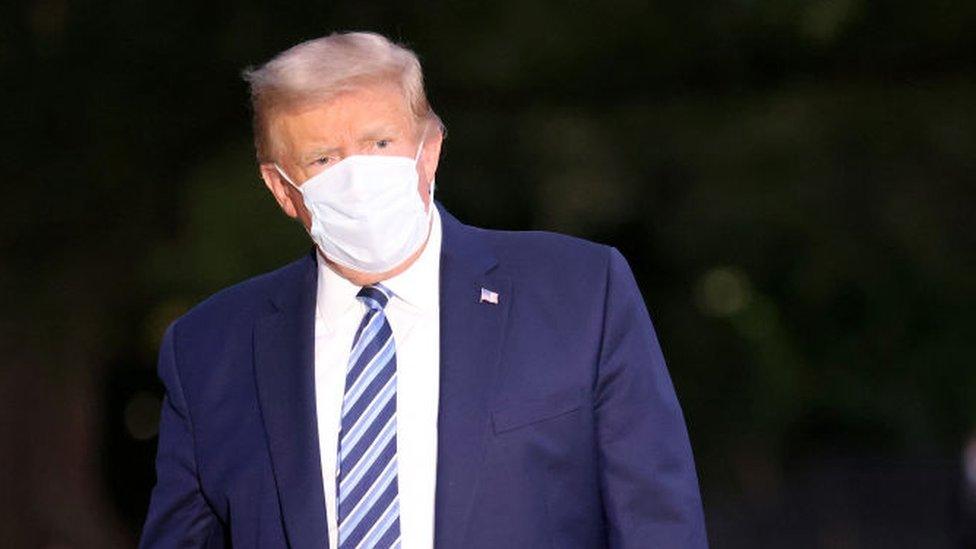
- Published5 October 2020
- Published15 April 2020
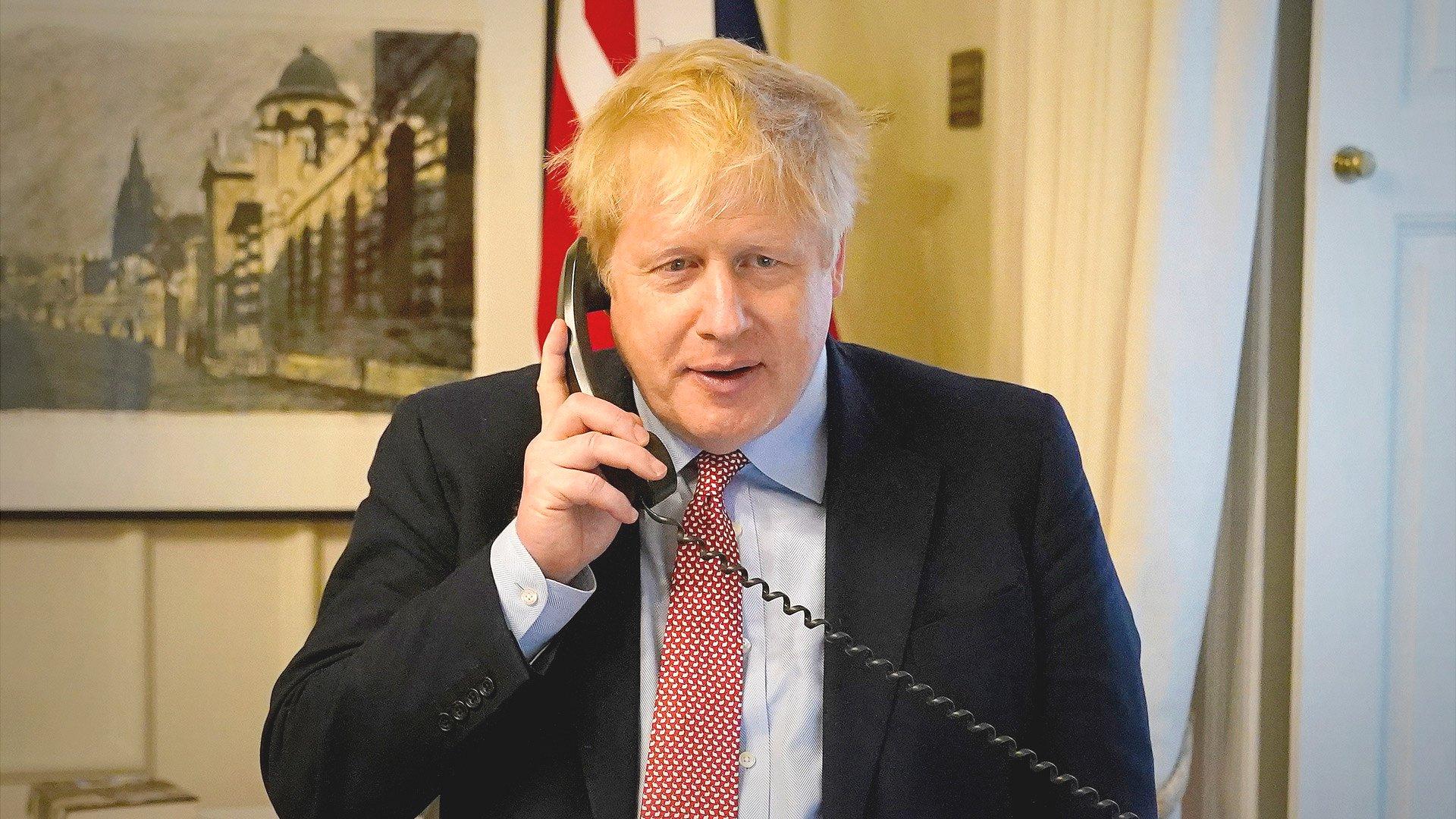
- Published16 April 2020
